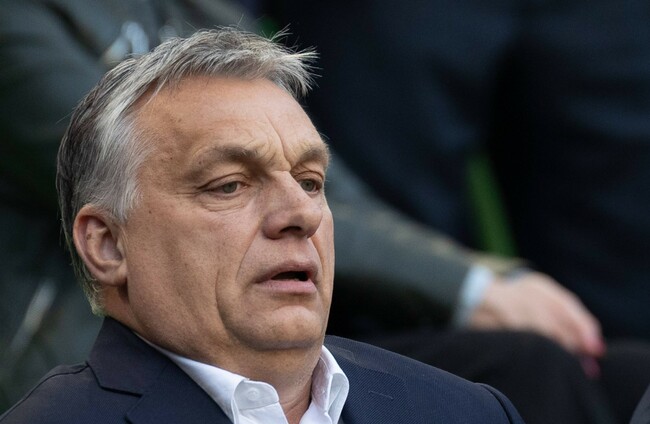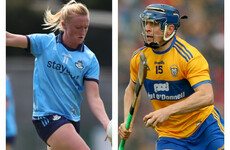THE EUROPA LEAGUE draw didn’t win points for subtle contrasts.
On the one hand there’s Bohemians, the fan-owned team renewing football’s idylls of community engagement and social enterprise; a club who have forgone a sponsor on their white away shirt for a message reading “Refugees Welcome” in partnership with Amnesty Internation.
And on the other are their opponents in the competition’s qualifying rounds next Thursday: Fehérvár, a lavishly-funded club who can count Prime Minister Viktor Orban among their regular attendees at games, a man who has denounced refugees as “invaders” and “poison.”
Orban is “football mad”, says former Hungarian soccer journalist János Botond Csepregi.
He has hardly missed a World Cup or European Cup final over the last two decades, and played semi-professionally in the Hungarian fourth division while in office and opposition.
His first official trip out of the country after his election as PM in 1998 was to the World Cup in France and a year later he took a call from Bill Clinton about the Yugoslav War in the middle of a training session.
In 2013, he described himself as “brain-damaged” after the national team lost 8-1 to the Netherlands.
Fehérvár are not quite Orban’s favourite team anymore – that honour goes to the club he helped to found, Puskas Akademia – but Orban is close to Fehérvár’s owner, István Garancsi.
Garancsi and Orban supposedly became close during a hiking tour of the Alps in 2009, when Orban was still in opposition. The pair became “rope friends”, as Garancsi secured Orbán’s rope during the climb.
Akademia was first envisaged as a feeder club to Fehérvár’s first team, but that formal arrangement has been abandoned as Akademia become a relatively successful first team in their own right. (On the same night as Bohs play in Hungary, Akademia face Zlatan-owned Hammarby in Sweden.)
In Hungary, it pays to be close to Orban.
Since returning to power in 2010, he has described the country as an “illiberal democracy”, with his anti-migrant invective furthering the first part as he tramples over the latter.
Using a parliamentary majority, Orban has chilled the media by appointing his own candidates to lead media regulators; influenced control over the judiciary by changing laws that allow his party, Fidesz, appoint judges; and has redrawn the electoral map, which has helped him remain in power even as his party has won fewer votes.
Football is a useful portal to get close to Orban, testified to by the fact that two of his team-mates from a university five-a-side team are now the country’s President and House Speaker.
Many political strongmen have their imposing symbols of power and decadence, and Orban’s is Akademica’s stadium. The gleaming Pancho Arena sits next to the village of Felcsút, Orban’s home village and site of his country holiday home. It is a gaudy seven stories high and seats 4,000 people, more than twice the population of Felcsút.
Not that the target audience is solely the people of Felcsút.
“Even if you hate football, you have to go to these matches,” Gyula Mucsi of the anti-corruption watchdog Transparency International told the Guardian in 2018. “It is the only place that the elite are willing to socialise with anyone outside of their small circle. Big construction and infrastructure development projects and plans which require a lot of money are basically decided in the skybox.”
Few nations have fallen from such heights of the game: this is a nation whose “Magical Magyars” left a permanent scar on England’s psyche by beating them 6-3 at Wembley; who reached the 1954 World Cup final; who helped staff the Real Madrid team that won the first five European Cups;…and have appeared at a single major tournament since 1986.
Orban has sanctioned enormous state investment in the game to restore Hungary’s standing in the game, and while this is likely driven by his genuine desire to see the country’s clubs and national team do well, the notion of restoring past and distant glories is a trope of most populist leaders.
“Football has been part of Orban’s nationalist repertoire”, writes David Goldblatt in The Age of Football.
Thus there has been an enormous state investment in football, and all the biggest sides have been given gleaming new stadia they’ll never fill.
Fehérvár have yet to fill the 14,200-seater arena that opened in 2018, while Debrecen play in a 20,000-seater stadium with average gates a fifth of that size. Even the biggest club, Ferencvaros, struggle to fill all of their 30,000 seats. State companies have been encouraged to invest in sponsorship, and the contract with State television is considered to be generous.
This was partly facilitated by a hugely controversial system called the TAO, in which companies were given a matching tax credit for donations to sport clubs. Many of the construction companies investing have been friendly to Fidesz.
Following a series of challenges, the Hungarian Supreme Court has ruled that corporate contributions to the TAO constitute public funds, which has heightened local criticism of Orban, who has been accused of wasting public funds on football at a time a third of Hungary’s 10 million people are living below the poverty line.
“It is continually a political issue, people are mad at it”, says Botond, “but not mad enough that Orban would lose elections.”
Botond is from the same part of Hungary as Orban – Székesfehérvár – and attended the same school, though an age-gap means Orban’s school days came at him in the form of photos on the school wall.
Orban was not always this way.
He came to prominence as an anti-communist agitator, and when he first became the leader of Fidesz, it was considered a largely liberal party. But election defeat in the 1990s saw he and the party slowly rebrand and target the centre-right middle class, and another defeat in 2002 has pushed he and the party even further to the right, exaggerating the supposed threat of migrants to play to a class of people left behind economically since the fall of Communism.
But it’s difficult to square Orban’s far-right rhetoric and present-day use of football with his experiences of playing the game as a youth. He made several moves when he was young, and eventually forced his way into Fehérvár’s (then named Videoton’s) youth team.
“The game brought together people from different backgrounds. Every time I changed team, I also changed cultures.”
Botond isn’t sure whether Uefa’s Covid regulations will allow Orban attend Fehérvár’s clash with Bohs, though says that he expects he’ll be there if it’s at all possible.
Bohs, meanwhile, won’t be wearing their “Refugees Welcome” shirt, as they’ve instead registered their blue away strip with Uefa.
Throughout the research and interviews for this article, we couldn’t find any examples of Orban denouncing the sponsors of that kit, Des Kelly Interiors.












Is someone chopping onions
Something in my eye… lovely letter
That is a really lovely sentiment….fair play.
Allons enfants de ls patrie! #Les Bleus
La jour de gloire est arrivé!
Could do with being translated again by something other than google translate.
Agreed but I also think it adds to the authenticity. Couldn’t help but read it in a French accent! Nice work, Irish fans.
We’re a great bunch of lads
Mam? WTF!
Sap.